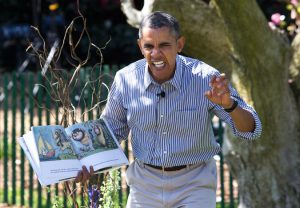Today’s New York Times gives us the best possible valediction for the best possible President. There are so many dense golden nuggets of wisdom in both the article about Obama’s reading and the transcript of the interview with him that it’s something of a challenge to choose. All the things I’ve believed about the radiantly mysterious power of stories to promote curiosity, build bridges, foster empathy, and offer escapes into opportunity are stated here in ways that remind us of just how fortunate we were to have eight years of a President who was thoughtful, compassionate, judicious, and deeply intellectual.
In today’s polarized environment, where the internet has let people increasingly retreat to their own silos (talking only to like-minded folks, who amplify their certainties and biases), the president sees novels and other art (like the musical “Hamilton”) as providing a kind of bridge that might span usual divides and “a reminder of the truths under the surface of what we argue about every day.”
He points out, for instance, that the fiction of Junot Díaz and Jhumpa Lahiri speak “to a very particular contemporary immigration experience,” but at the same time tell stories about “longing for this better place but also feeling displaced” — a theme central to much of American literature, and not unlike books by Philip Roth and Saul Bellow that are “steeped with this sense of being an outsider, longing to get in, not sure what you’re giving up.”
Mr. Obama says he is hoping to eventually use his presidential center website “to widen the audience for good books” — something he’s already done with regular lists of book recommendations — and then encourage a public “conversation about books.”
“At a time,” he says, “when so much of our politics is trying to manage this clash of cultures brought about by globalization and technology and migration, the role of stories to unify — as opposed to divide, to engage rather than to marginalize — is more important than ever.”
